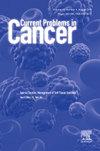食管鳞状细胞癌靶向治疗的现状。
IF 2.3
4区 医学
Q3 ONCOLOGY
引用次数: 0
摘要
食管癌是全球第七大常见恶性肿瘤,主要分为腺癌和鳞状细胞癌(SCC),主要组织学类型因地区而异。在包括美国在内的西方国家,腺癌更为常见,而在东亚国家,鳞状细胞癌更为常见,在日本,鳞状细胞癌占病例的 86%。虽然腺癌在西方人群中呈上升趋势,但在全球食管癌病例中,SCC 仍占大多数。细胞毒性化疗一直是治疗的主流,然而,包括表皮生长因子受体、表皮生长因子受体、PI3K 或 CDK4/6 在内的靶向疗法尽管显示出初步疗效信号,但尚未获得监管部门批准。最近,免疫检查点抑制剂(ICIs)显示出了疗效,并被批准作为晚期食管 SCC(ESCC)的单一疗法或联合疗法。虽然 PD-L1 表达是 ESCC 使用 ICIs 一线治疗的唯一临床适用生物标志物,但对 ICIs 的反应多种多样,新型预测性生物标志物也在研究之中。此外,新型抗体药物结合物(ADC)有望用于晚期 ESCC。本综述介绍了晚期ESCC潜在靶向治疗的现状和未来前景。本文章由计算机程序翻译,如有差异,请以英文原文为准。
Current landscape of targeted therapy in esophageal squamous cell carcinoma
Esophageal cancer is the seventh most common malignancy worldwide and is primarily categorized into adenocarcinoma and squamous cell carcinoma (SCC), with the predominant histological type varying by region. In Western countries, including the United States, adenocarcinoma is more prevalent, whereas in East Asian countries, SCC is more common, with it constituting 86% of cases in Japan. Although there has been an increasing trend of adenocarcinoma in Western populations, SCC still accounts for the majority of esophageal cancer cases globally. Cytotoxic chemotherapy has been the mainstay of treatment, however, targeted therapies including EGFR, FGFR, PI3K, or CDK4/6, despite showing preliminary efficacy signals, have not yet received regulatory approval. Recently, immune checkpoint inhibitors (ICIs) have shown therapeutic efficacy and have been approved as a monotherapy or combination therapy for advanced esophageal SCC (ESCC). Although PD-L1 expression is the only clinically applicable biomarker for first-line therapy with ICIs in ESCC, responses to ICIs are various, and novel predictive biomarkers are under investigation. Furthermore, novel antibody-drug conjugates (ADC) hold promise for advanced ESCC. This review includes the current landscape and future perspectives of potential targeted therapy for advanced ESCC.
求助全文
通过发布文献求助,成功后即可免费获取论文全文。
去求助
来源期刊

Current Problems in Cancer
医学-肿瘤学
CiteScore
5.10
自引率
0.00%
发文量
71
审稿时长
15 days
期刊介绍:
Current Problems in Cancer seeks to promote and disseminate innovative, transformative, and impactful data on patient-oriented cancer research and clinical care. Specifically, the journal''s scope is focused on reporting the results of well-designed cancer studies that influence/alter practice or identify new directions in clinical cancer research. These studies can include novel therapeutic approaches, new strategies for early diagnosis, cancer clinical trials, and supportive care, among others. Papers that focus solely on laboratory-based or basic science research are discouraged. The journal''s format also allows, on occasion, for a multi-faceted overview of a single topic via a curated selection of review articles, while also offering articles that present dynamic material that influences the oncology field.
 求助内容:
求助内容: 应助结果提醒方式:
应助结果提醒方式:


